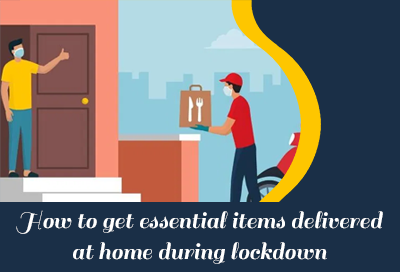
E-commerce organizations including Amazon, Flipkart others will presently have the option to deliver essential items once the country enters lockdown 3.0 from May 4. However, delivery of non-essential items by means of a web based business may be applicable for individuals living in green and orange zones. As the across the country lockdown to stop the spread of the novel coronavirus has extended till May 17, E-business giants Amazon and Flipkart have asked the legislature to permit them to sell essential things during the lockdown set up to control the spread of Covid-19.
In the midst of the coronavirus pandemic, the Indian government reported an across the nation lockdown on March 25 to stop the spread of the deadly disease. Following the news, there has been a spike in requests of basic products. With the limitation of movement, individuals thought that it was hard to get hold of even the basic supplies. With that impact, online grocery startups like BigBasket and Grofers, accelerated their procedure to satisfy the need and recruited new representatives to smoothen the way toward conveying essential items to their clients.
To India presently undergoing a protracted lockdown to control the spread of COVID-19, the move comes as a much-needed relief, as it will make necessary items more accessible and accessible to shoppers throughout India. Here is a list of E-commerce websites that giving door-to-door delivery of essential items during lockdown.
Here’s You Can Get Essential Items Delivery During Lockdown
1. NoBroker
Online property portal NoBroker additionally launched a grocery service for home delivery on its built-in vacationer and neighbourhood administration app NoBrokerHood to allow society residents to order day by day necessities at their doorstep in the wake of the lockdown due to COVID-19 pandemic. The startups have already begun turning in groceries in cities like Bengaluru, Pune, Chennai, and Hyderabad, and plans to quickly prolong the service to different cities, such as Delhi, Mumbai and many more.
2. Instamojo
Bengaluru-based digital charge startups Instamojo has come up with an initiative for physical stores, pharmacies, and logistics businesses to assist supply necessities during the lockdown. The startups is providing ‘Priority KYC’ on its platform for these necessary offerings to go on-line in much less than 5 minutes.
3. Swiggy
Foodtech unicorn Swiggy has been selling grocery items on its platform for a long time now with its Swiggy Store vertical. Amid the pandemic, it has multiplied there home delivery services to over a hundred twenty five cities throughout India. Further, it has partnered with numerous brands and retailers, for example, HUL, P&G, Godrej, Dabur, Marico, Vishal Mega Mart, Adani Wilmers, Cipla, and many different cities-specific stores, to provide branded essential products and meal items to their customers. As per to Swiggy, the provider is being fulfilled via neighbourhood kirana shops and distribution centres of the large brands. The feature is also available on the Swiggy app under the name ‘Grocery’ tab.
4. Curefit
Bengaluru-based wellbeing startups Curefit, under its Whole. Fit vertical, has introduced an extensive variety of grocery essentials items delivery, and aims to supply the essential items inside 24 hours of putting the order. It has additionally moved to contactless shipping to reduce contact with customers.
5. CoutLoot
Mumbai-based social ecommerce startups and offline-to-online enabler CoutLoot currently brought an ‘Essentials’ provider class on its platform. The new class is leveraging CoutLoot’s big offline vendor community to safely supply and select essential items offered through its platform. CoutLoot has listed numerous grocery shops, medical stores, vegetable vendors, etc., on its platform.
During these annoying times, route planning and optimization are of utmost importance. Above mentioned tips to order food online and essential items, will help you for shopping in this crisis time. E-commerce and E-grocery players are additionally imposing contactless deliveries and cashless transactions to make certain the protection of each the delivery executive and the customer. Numerous enormous retail outlets have additionally been forced to permit a least number of individuals to be available inside store premises to ensure there is adequate distance between them.